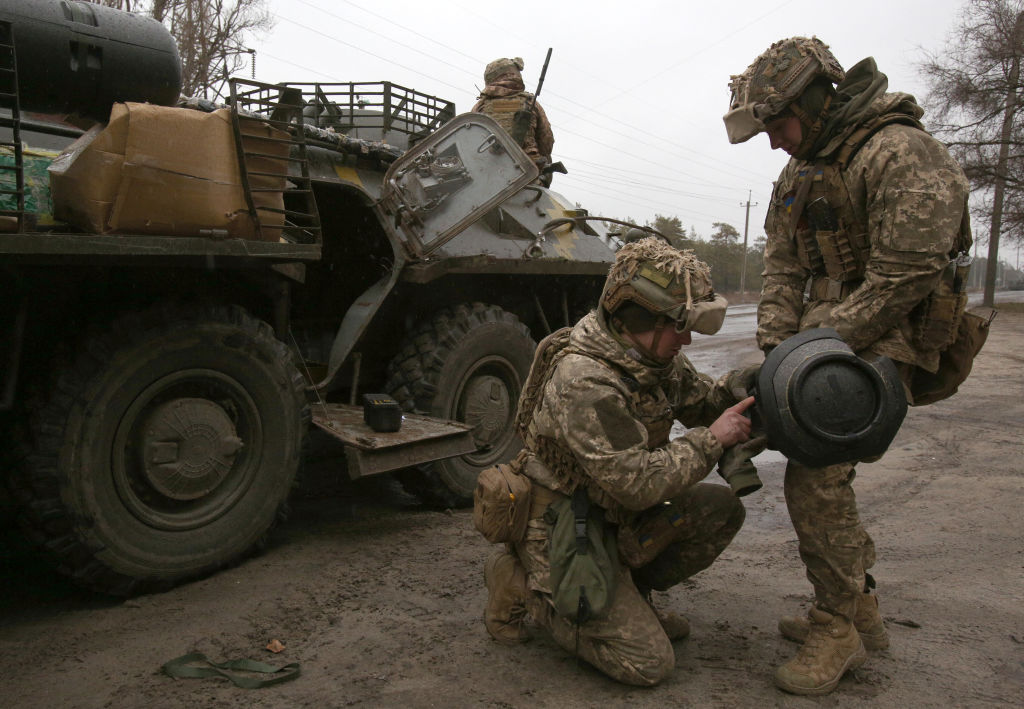Ukrainian envoy to Australia says aid is reaching troops and they will fight on

Military and humanitarian aid sent by friendly countries is reaching Ukrainians fighting the invading Russian forces, says the head of Ukraine’s diplomatic mission in Australia, Volodymyr Shalkivskyi.
Many countries, including Australia, have offered aid to Ukraine, raising the question of whether, given the heavy fighting, it can reach the troops and the civilians who need it.
Shalkivskyi responds in an ASPI interview that Ukrainians are grateful for the world’s fast response. Poland serves as a gateway for these supplies, which are then transported through western Ukraine to other regions, he says.
He warns that much now depends on whether Russian President Vladimir Putin can pressure his close ally, Belarus’s Alexander Lukashenko, to use his country’s forces to cut those western supply lines.
‘I believe that he’s under tremendous pressure from Putin to get it done, and Mr Lukashenko depends 100% on Putin.’ Shalkivskyi says he hopes Belarusian forces will not intervene officially, though some are reportedly already in Ukraine.
‘In case the Belarusian army officially rolls into our territory, of course it will be challenging to us, but we will prevail. We will sustain this pressure and we will fight back.’
Shalkivskyi believes Putin is adapting his strategy as he encounters much tougher opposition than expected. His initial idea was to control all of Ukraine after a quick military campaign and then to install a pro-Russian government. An option for Putin now might be to establish a second capital in eastern Ukraine and declare it a new country. That would require a very large Russian occupation force, which, given Russia’s heavy bombing campaign, would face strong resistance from Ukrainian citizens, even Russian-speaking citizens and those of Russian ethnicity.
There’s a significant minority of ethnic Russians living in eastern Ukraine, where much of the fighting is underway, says Shalkivskyi. ‘But we see how local communities react when the Russian troops are entering the villages, the towns, that they’re supporting our military, that they’re supporting territorial defence forces, because simply they do not want to align with the Kremlin, with Putin.’
Putin might capture a Ukrainian city, declare it a capital and install a puppet government, Shalkivskyi says. But then they’d have to keep that area under control and that would require hundreds of thousands of troops. ‘I doubt that they have such resources.’
While Russia has so far admitted to suffering close to 500 casualties among its attacking forces, Shalkivskyi says Ukraine believes the numbers are much higher and the Russians have lost more than 5,000 personnel. Conditions on the ground mean it’s hard to be certain. He says Ukraine has lost more than 1,000 members of its military and about 350 civilians, including 16 children.
Shalkivskyi says Ukraine has taken at least 200 Russian prisoners. Some of them have said they were told they were taking part in a military exercise and didn’t know they’d find themselves in a real war. ‘They were told that this is exercises, military exercises, or that they’re going to liberate Ukraine and people will greet them with flowers, but instead people greeted them with Molotov cocktails. So, it’s a big surprise to them. Some of them are just prefer to give up.’
Ukrainian authorities have also captured Russians who arrived as spies or saboteurs. Some of those pretending to be Ukrainians were unmasked because they couldn’t pronounce more complex words in the local language. Regular Russian troops who’d run out of supplies stole food and fuel from Ukrainian shops and petrol stations.
Ukraine’s forces are heavily outnumbered, says Shalkivskyi, but morale remains high and they are determined to keep fighting. Russia has air superiority, but armed drones provided to Ukraine by Turkey have proved effective in striking Russian armoured columns.
American intelligence on Russia’s intentions in the lead-up to the invasion proved very accurate and Ukraine relies on that flow of information continuing because it doesn’t have access to its own satellite surveillance.
Now that Putin has raised the level of preparedness of Russia’s nuclear forces, is he likely to use a nuclear weapon if his attack on Ukraine goes badly?
‘I hope not,’ says Shalkivskyi, ‘but I cannot say that he’s a mentally stable person or that you can apply normal logic to his actions. So it’s really difficult to comment.’
Shalkivskyi says his embassy has received many calls from Australians wanting to help in many ways. Some want to send money, some offer to host refugees, a truck driver wants to help transport humanitarian aid and a medically trained person wants to help treat casualties in hospitals. And yes, some want to go to Ukraine and take up arms, he says. Shalkivskyi tells them that they must be sure they will not breach Australian laws in doing so.
Some countries, including the UK, Denmark and Latvia, have said their citizens can go to Ukraine to fight, Shalkivskyi says. ‘But again, there are different ways to help Ukraine. It is not only about fighting with weapons. You can assist with the simple help on the ground with humanitarian aid.’
